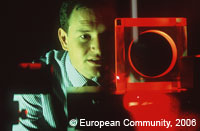Key messages from NEST for the success of frontier research
Seven key criteria for the success of frontier research are given by NEST, the European Commission's new and emerging science and technologies activity, in a new publication covering the proceedings of a 2005 conference. NEST was introduced in the Commission's Sixth Framework Programme (FP6), and was intended to enable the Commission to react to new scientific questions as they emerged. Much of this responsibility will be taken up by the European Research Council (ERC), which is due to launch as FP7 begins. The seven criteria, described as 'messages from NEST for the success of frontier research', are: respecting scientific freedom; rewarding scientific inventors; allowing for smaller projects; promoting social responsibility; risk-tolerant scientific peer review; applying user-friendly procedures; and building trust through transparency. Expanding on 'rewarding scientific inventors', the document calls for support for pioneering projects 'with visionary, scientifically sound objectives where considerable pay-off for science, economy or society may be achieved, even if there is a risk of failure'. Under the 'applying user-friendly procedures' heading, the document highlights the importance of minimising the investment of resources by proposers and reviewers, for example by using remote refereeing and two-stage submission and selection procedures.



